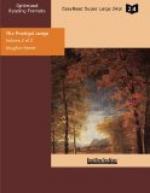A little later the men came up the lane, to disappear in the direction of the tavern. Hannibal peered after them. His very terrors, while they wrenched and tortured him, gave him a desperate kind of courage. As the gloom hid the two men, he started forward again; he must know the meaning of that sound —that splash, if it was a splash. He reached the end of the cornfield, climbed the fence, and entered a deadening of slashed and mutilated timber. In the long wet grass he found where the men had dragged their burden. He reached down and swept his hand to and fro—once—twice—the third time his little palm came away red and discolored.
There was the first pale premonition of dawn in the sky, and as he hurried on the light grew, and the black trunks of trees detached themselves from the white mist that filled the woods and which the dawn made visible. There was light enough for him to see that he was following the trail left by the men; he could distinguish where the dew had been brushed from the long grass. Advancing still farther, he heard the clear splash of running water, an audible ripple that mounted into a silver cadence. Day was breaking now. The lifeless gray along the eastern horizon had changed to orange. Still following the trail, he emerged upon the bank of the Elk River, white like the woods with its ghostly night sweat.
The dull beat of the child’s heart quickened as he gazed out on the swift current that was hurrying on with its dreadful secret. Then the full comprehension of his loss seemed to overwhelm him and he was utterly desolate. Sobs shook him, and he dropped on his knees, holding fast to the stock of his rifle.
“Uncle Bob—Uncle Bob, come back! Can’t you come back!” he wailed miserably. Presently he staggered to his feet. Convulsive sobs still wrenched his little body. What was he to do? Those men—his Uncle Bob’s murderers—would go to his room; they would find his empty bed and their search for him would begin! Not for anything would he have gone back through the corn-field or the lane to the road. He had the courage to go forward, but not to retrace his steps; and the river, deep and swift, barred his path. As he glanced about, he saw almost at his feet a dug-out, made from a single poplar log. It was secured to an overhanging branch by a length of wild grape-vine. With one last fearful look off across the deadening in the direction of the tavern, he crept down to the water’s edge and entered the canoe. In a moment, he had it free from its lashing and the rude craft was bumping along the bank in spite of his best efforts with the paddle. Then a favoring current caught it and swept it out toward the center of the stream.
It was much too big and clumsy for him to control without the stream’s help, though he labored doggedly with his paddle. Now he was broadside to the current, now he was being spun round and round, but always he was carried farther and farther from the spot where he had embarked. He passed about a bend; and a hundred yards beyond, about a second bend; then the stream opened up straight before him a half-mile of smooth running water. Far down it, at the point where the trees met in the unbroken line of the forest and the water seemed to vanish mysteriously, he could distinguish a black moving object; some ark or raft, doubtless.




